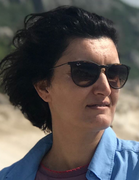July 24, 2019

Name: Nurgül BALCI
Title: Professor
Institution: Istanbul Technical University, Department of Geological Engineering, Ayazaga Campus
Place of Residence: Istanbul, Turkey
What kind of science do you do?
I am a geomicrobiologist dealing with microbe-mineral interactions in extreme environments (e.g acidic, hypersaline, hot springs) to understand evolution of life on Earth and other terrestrial planets in our Solar System. Also, I would like to understand geochemical conditions of the early Earth and how life started to flourish. By doing this kind of research I am hoping that one day as humans we will explore the other planets and find a backup place.
Why did you choose this field?
When I watch the sky on a clear day, I keep wondering why we are here, what makes Earth so special? How did life cope with such harsh conditions to survive? I am absolutely fascinated by survival strategies of microorganisms under such harsh conditions in which we humans can not make it even for a short time. This became my motivation.
What's the most interesting place you've ever done field work?
I recently went to Mongolia to collect samples from different lakes. This was truly incredible experience. The most breathtakingly beautiful landscapes and endless lands give you an infinite feeling. I don't want to pass without mentioning about friendly and sharing people there. My other favorite place is the lake district of Turkey where I have been working on last 10 years. Lake Salda, considered as a good analog place to Jezero Crater recently discovered on Mars due to its unique hydromagnesite stromatolites and Lake Acıgol, a hypersaline evaporative lake with distinct carbonate minerals. These places are natural laboratories and provide excellent opportunities not only for understanding life limits but also for searching bio signatures preserved in such conditions.
What are you working on now?
My students and I are currently working on Lake Salda and Acıgol. We are trying to understand how biologic networks control carbonate mineralogy and what extend microorganisms contribute to overall processes; more importantly if such carbonates preserve biological fingerprints. Lake Salda contains significant amount of Mg and actively growing hydromagnesite stromatolites, which is one of few places on Earth that hold such formations. We aimed to elucidate how such lakes form as a result of water-rock interactions and what extend biogeochemical processes contribute to formation of hydrated Mg-carbonates.
Any advice for someone starting out in geochemistry?
You should do what you like most. Earth is a complex place and different dynamics, regulated by laws of physics, chemistry and biology, interplay together to shape the Earth. Therefore, you need a lot of patience to make sense of things. Keep in your mind this a journey that always has two sides up and down. Your job is being on up side by improving your scientific knowledge.
If you could sit next to anyone on an airplane, who would it be?
This is a tricky question and little bit hard to pick. I would like to sit next to Hypatia who was truly pioneering for women in science and talk about her works astronomy. I admire her also for not giving up on her beliefs. I assume that I am sitting in the middle. On my other side, I would like to sit next to Nuri Bilge Ceylan, a famous Turkish movie director. I find his movies as a good bland of visual and aural poem, which gives you mediated feelings.
What's your favorite city in the world and why?
My favorite city is Istanbul where I actually work and live. It is cosmopolitan, cultural and full of energy besides having historical places. It is a great feeling to live in such an historical city, it is really old! It goes back at least to 8,000 years. You feel like being a part of history.
What is your favorite downtime activity?
I like reading books about popular science, history of science and history. Above all, spending time with my son.